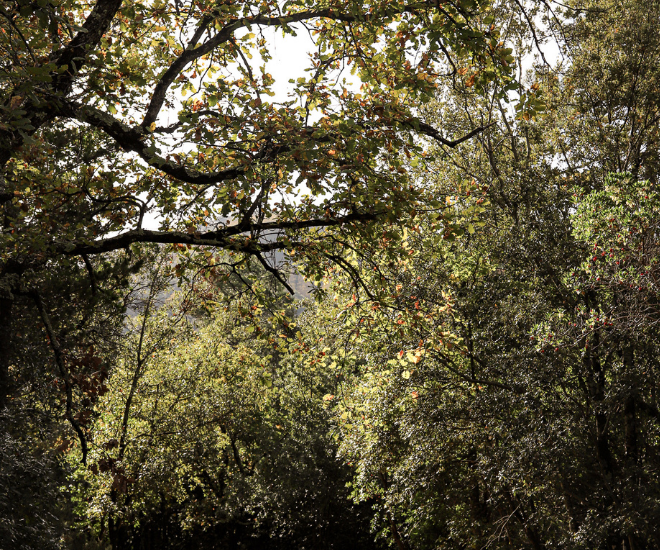The Vignamaggio woods are scattered with paths that wind through a rich, fragrant and welcoming Mediterranean vegetation: the trees are not very large, but healthy and lush. Through their foliage one can glimpse the remains of ancient dry-stone walls, reminders that every corner of this land was once cultivated and that the woods, before the 1960s, were actually demarcated.
We went down to the woods with Francesca, head of the Vignamaggio gardens, to explore a small area of the Luco Woods. The Greek word louko, means “sacred woods”.
Here one can stroll amongst vegetation very characteristic of Chianti’s warmest areas. We see stone pine, cypress, downy oak, holm oak and an undergrowth of rock rose, heather, strawberry tree, juniper, broom, fern, hawthorn and more.
Shaded by the oak and cypress trees, we went hunting for Christmas decorations, and while we did, we learned a little more about some of these plants.

THE HAWTHORN
The hawthorn is a thorny shrub with delicate white flowers in spring. From autumn until the end of winter, its tiny, compact fruit, a splendid dark burgundy colour that turns purple, can be seen scattered throughout the woods. The round berries are extremely hardy and remain on the shrub for a long time.

THE STRAWBERRY TREE
A small shrub with round and juicy red berries, the strawberry tree owes its Latin name to Pliny the Elder, who evidently was not a great admirer of its fruit. He named it unedo (unum = one and edo = I eat), meaning “I’ll only eat one”, and implying that eating one did not inspire him to eat another.
It is between late October and December that the fruit of the strawberry tree reveals its sweeter side, in the mouth and on the eyes. The soft, sweet-and-sour fruit is can be difficult to stop eating, and the little green trees dotted with red are pleasant reminders that the festive season is almost upon us.

THE DOG ROSE
At Vignamaggio the dog rose, also named by Pliny the Elder, can be found at the edges of woods, lining meadows that flank the vineyards and growing along roadsides. The hardy dog rose, Italy’s most common wild rose, thrives in dry soil and is resistant to cold and heat.
It is spectacular in spring as it flaunts its pinkish white roses, but autumn is when its fleshy, brick red rosehips makes it easier to identify. This fruit is an absolute panacea for the immune system. Pliny’s reference to “dog” in his name for it, was probably due to the virtues of its fruit and its roots, containing enough properties to cure a Roman soldier of rabies.
Rosehips can be made into delicious jams, herbal teas and syrups, but a long twig in a vase also makes the perfect autumn decoration.
There are countless natural decorations other than the strawberry tree, hawthorn and dog rose to be found in the woods. All it takes is a little imagination while you enjoy a peaceful walk. What about an oak twig with dangling acorns, or a basket full of coloured leaves and pinecones, to bring the feeling of the woods into your home.

